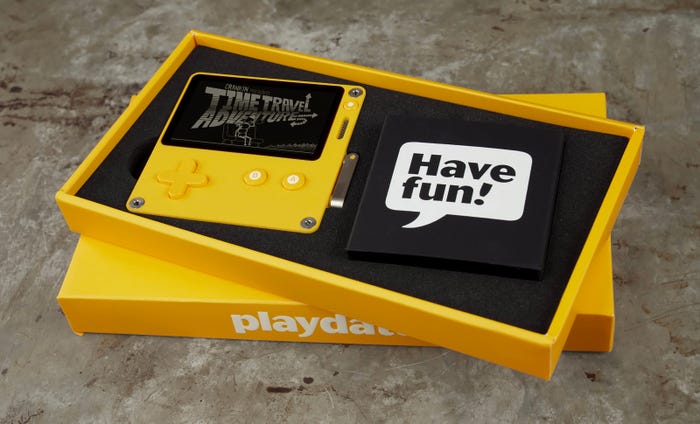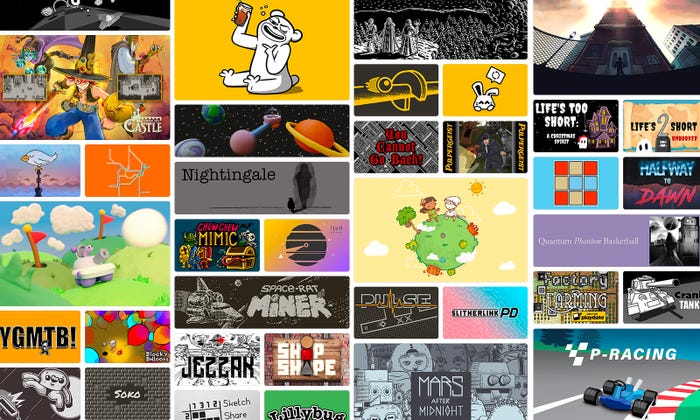Trending
Opinion: How will Project 2025 impact game developers?
The Heritage Foundation's manifesto for the possible next administration could do great harm to many, including large portions of the game development community.
"It's beyond our wildest dreams in terms of how many developers have embraced it and the quality of the titles that we're seeing."

One of the biggest challenges Panic faced after deciding to create Playdate was actually getting the magical yellow console into the hands of expectant fans. The ditty machine sold over 20,000 units within hours of pre-orders going live in 2021, and as interest in the device swelled, so did the size of the task that software-maker-turned-hardware-manufacturer Panic faced.
Earlier today, the company announced it has finally caught up on all Playdate pre-orders, bringing to an end a winding journey that began almost three years ago. That means the Portland-based company has now sold and shipped over 70,000 units worldwide, but in many ways, it feels like this is where the adventure might truly begin.
"It was more challenging than we expected," explains Panic's head of special projects, Greg Maletic, during a chat with Game Developer last week. "Demand was strong, but it took a long time to get the parts we needed to produce Playdate. COVID certainly played a part in that, and the CPU, in particular, was tricky. But we're finally caught up now."
That journey saw Panic delay the launch of Playdate after accepting pre-orders to solve a "critical battery issue" and swap out the device's CPU to address a chip shortage. "It has been a big learning curve," continues Maletic, discussing how the team overcame those hurdles.
"I mentioned the parts shortage, but the CPU was really the trickiest thing that we had to source. And we made the CPU change at around unit 35,000, so roughly halfway through [production]. That was a big software challenge because the CPUs are compatible, but there are always differences that you have to work through. So we spent probably around nine months just making everything run properly on the new CPU."
Maletic says swapping out the CPU so early in the console's lifespan was a "dramatic" thing to do and caused huge debates internally. He adds that he personally would've preferred to avoid the switch-up, but having come out the other side, he feels that transitioning between the two architectures has been "pretty smooth."
"That was a good achievement for us to have made that switch, and now we'll be on a path where we believe we have much better availability of parts," he adds.
Maletic hopes the company's new approach to orders—which will see Panic send out notifications when Playdates are in-stock and ready to ship—will more effectively unite console and consumer.
"We still have issues in terms of availability. It'll be bursty. We don't know how people will react to this news, and whether the stock we have will take days to empty or weeks and months," says Maletic. "But we realized that potential customers didn't really know that Playdate was available, even though we've been selling them steadily and shipping very quickly for the past four months."
Maletic reiterates that people can still order when Playdate is out of stock, but feels that being more vocal about stock levels will enable Panic to establish a smooth cadence when it comes to shipping. "The difference now is that the window between [placing an order and shipping] will be much shorter," he says. "It'll either ship immediately or ship within a matter of weeks, whereas previously we had some customers waiting a year or more to get their Playdates because it took us a while to get rolling."

A young Playdate about to embark on an adventure // Image via Panic
Ultimately, Panic feels there's no "perfect strategy" when it comes to selling and shipping hardware. Maletic says the company could've opted to notify customers when it had a bulk supply ready to ship, but feels that would've left people scrambling.
"A lot of companies will say something like 'okay, we've got 10,000 devices ready to go' and people will essentially rush their website," he continues. "It's just a lot of work to put on the customer. So that's why we're still letting people place an order anytime, and even though you have to put money down upfront, it's cancellable. At least then, you're secure in the knowledge that one is reserved for you and will be coming your way. That's the model we're sticking with for now."
Despite all the challenges Panic has faced to reach this point, Maletic says the whole Playdate project has been incredibly gratifying. On a business level, it has already been a resounding success. Initially, Panic felt it might sell around 10,000 units. In hindsight, that must seem like a ludicrous lowball, but it's a number that underlines the irresistible, cosmic allure of the plucky handheld.
Though admittedly important, sales aren't the only measure of success, and Maletic says that hearing customers and developers wax lyrical about the console is perhaps the biggest indicator that it's building something special.
"People are very happy with what they have," he says, "so we feel like we've succeeded already. We send out a customer survey when people are done playing their seasons and people seemed extremely happy with both the hardware and the season model. The question now is how much further can we take this? Enthusiasm hasn't really settled down and so the goal this year is to promote the fact that we have Playdates to sell and the quality of the games is really fantastic."
Maletic isn't wrong. There are times when you feel developers might have squeezed every drop of juice out of Playdate, only to clap eyes on another barmy project that forces you to rethink what the crank-toting handheld is capable of. Maletic is thankful for the love and support the development community has shown Playdate, and explained devs rallied behind the console from minute one.
"I think we very quickly had like 40,000 people on our developer list," he recalls, thinking back to when the console broke cover in 2019. "It's beyond our wildest dreams in terms of how many developers have embraced it and the quality of the titles that we're seeing. We want to make sure people know about that and can see what kind of market this has blossomed into."
To do that, Maletic says it's time for Panic to start properly championing Playdate software. "One of the things we contended with early on was 'is this actually going to work? Is the hardware ever going to ship?' We're past that phase now, and now we want to really emphasize that there are a lot of really unique titles coming to Playdate."
He says experiences like Mars After Midnight, which is being developed by Return of the Obra Dinn creator Lucas Pope, will hopefully encourage people to take a punt on the device and reward those who've already committed to the platform. And a 'platform' is precisely what Panic hopes to build.
Since launching Playdate, the company has rolled out an official marketplace called Catalog that currently houses over 120 titles—with more being added each month. Maletic says Panic is committed to releasing a steady stream of games through Catalog—though it's possible to sideload projects from other storefronts like Itch—but won't be flooding the storefront.

A selection of Playdate titles currently available on Catalog // Image via Panic
"Games have been coming in faster than we feel it's responsible for us to add them to Catalog," he says. "I know it's frustrating for developers, but we just don't want to release that fast on Catalog. [We don't want] to just dump a load of games and overwhelm users, and that would also go against the developer's interest because they don't want to be one of 30 that gets released on update day."
Maletic feels that uploading titles to Catalog in batches of five (or thereabouts) is working pretty well so far, and reiterates that Panic wants each developer to have their day in the sun. He also says Panic is working to improve discoverability and the backend functionalities of the platform as more developers enter the fray, letting them more effectively track sales numbers and other useful data.
If developers only take one thing from this interview, it should be this: Playdate is here to stay. When asked if Panic's hardware business was secure for the long term, Maletic answered with a resounding 'yes.' And as you'd expect, the company is committed to keeping the party going for "quite a bit longer."
"I think we're going to see some incredible stuff this year," says Maletic. "There's no end in sight at this point."
Read more about:
Top StoriesYou May Also Like